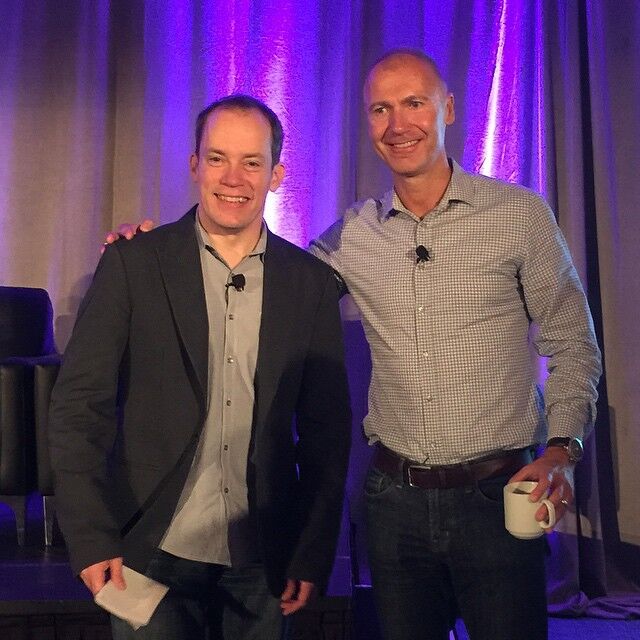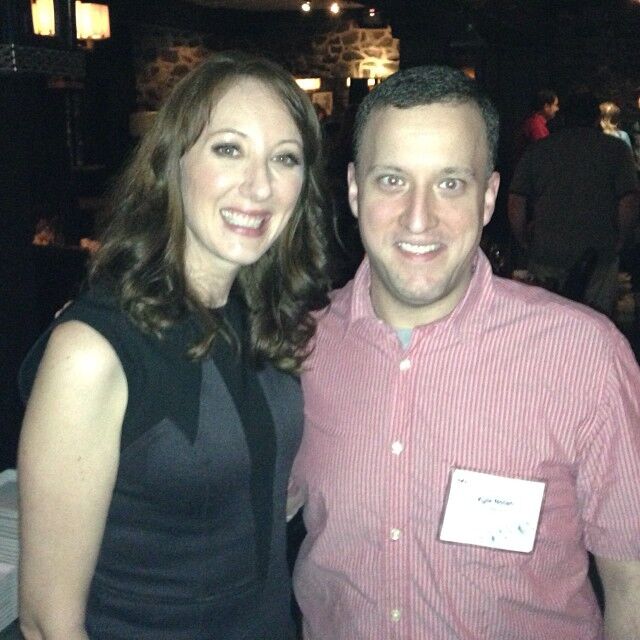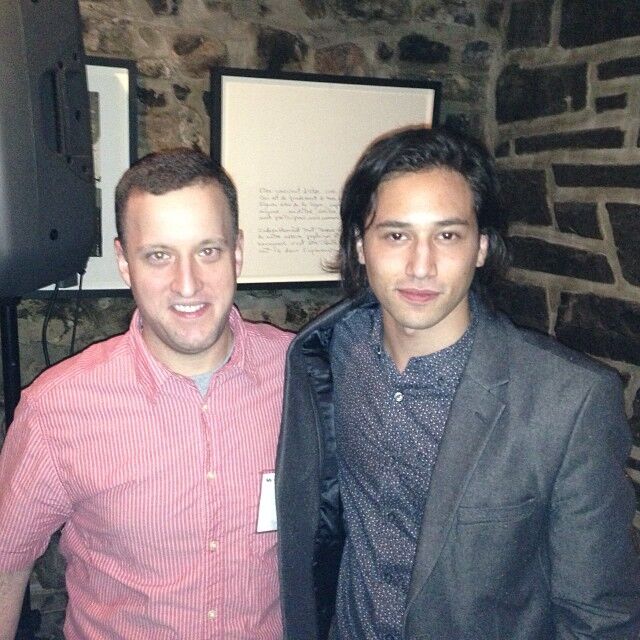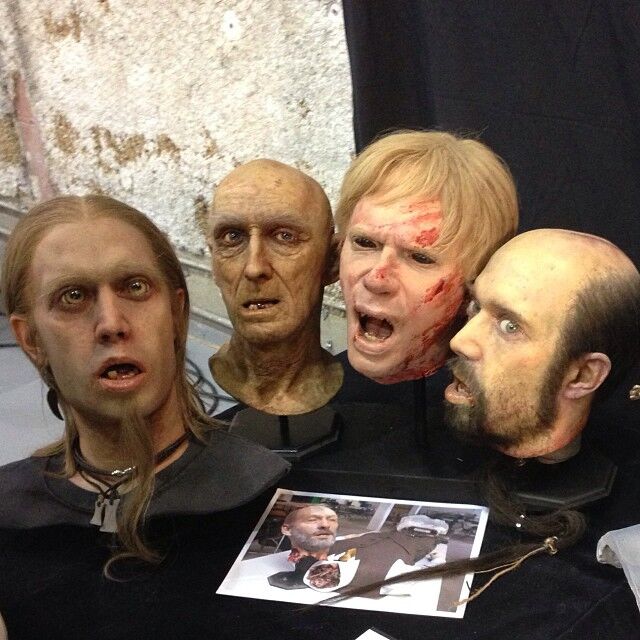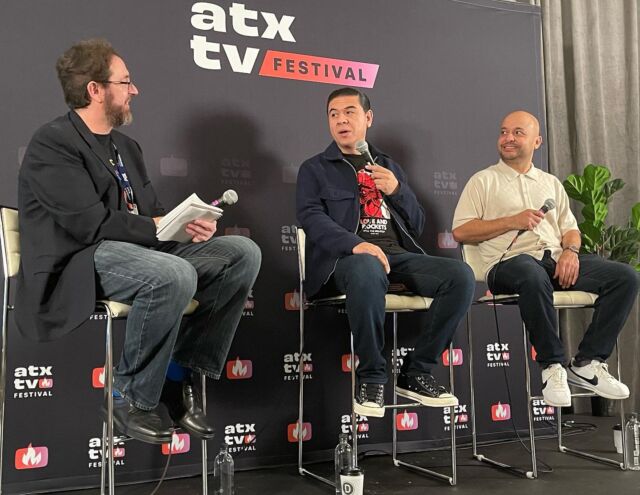 Fred Melamed is an actor’s actor, who has built a solid reputation for his stage and film work, having worked with such cinema giants Woody Allen and Joel and Ethan Coen. He’s played a host of supporting roles on TV, including Larry David’s psychiatrist on HBO’sCurb Your Enthusiasm, and has appeared in such Woody Allen classics as Hannah and Her Sisters, Radio Days, Crimes and Misdemeanors, Shadows and Fog, Husbands and Wives, and Hollywood Ending. But Melamed is perhaps most recognizable for his memorable portrayal as the home-wrecking Sy Ableman in the Coen Brothers’film A Serious Man.
Fred Melamed is an actor’s actor, who has built a solid reputation for his stage and film work, having worked with such cinema giants Woody Allen and Joel and Ethan Coen. He’s played a host of supporting roles on TV, including Larry David’s psychiatrist on HBO’sCurb Your Enthusiasm, and has appeared in such Woody Allen classics as Hannah and Her Sisters, Radio Days, Crimes and Misdemeanors, Shadows and Fog, Husbands and Wives, and Hollywood Ending. But Melamed is perhaps most recognizable for his memorable portrayal as the home-wrecking Sy Ableman in the Coen Brothers’film A Serious Man.
We recently talked to Fred about his love of Chekhov, becoming Sy Ableman, and his latest role in the upcoming film, In a World, which won the prestigious Waldo Salk award for Best Screenplay at this year’s Sundance Film Festival.
I know you took a hiatus from the theater. Couldn’t you have picked something a little less heavy than a Chekhov play?
I really enjoyed it. I hadn’t done a Chekhov play in many years. For most actors, Chekhov is extremely rich, full of things to act, and I had a great time doing it. Though the characters are often unhappy in a Chekhov play, I don’t find it heavy to do. The motives within it are always comprehensible and human. Even when it’s kind of bleak, there’s always a strong comic element to Chekhov. If you do a Beckett play, that’s always a very stark — I don’t want to say depressing — but you’re dealing with a world that is without hope. Chekhov’s world isn’t like that. Chekhov’s world is full of missed connections and missed opportunities, but the characters always find ways to be hopeful. In spite of the fact that people come up against all sorts of unanticipated misery in their lives, they find ways to go on and be hopeful. That’s kind of universal.
Do you find yourself gleaning that message from your work?
I think to some extent you can’t help that. A play is different than a movie, obviously in a number of ways. But in a play you have a lot of time to steep yourself in the world of that play and that character, [so] that it begins to affect you in a semi-conscious way. I don’t think you can avoid that. I think to be a good actor, you have to be willing (and part of the reason I wasn’t active for so long) to go to parts of yourself that people often don’t want to make public. You repeat the same thing, night after night, which makes you absorb the play, somewhat more internally than in a movie. You always have to commit fully — as Phillip Seymour Hoffman says, “Everybody knows you have to commit fully, the question is commit to what?” I always find that the character is always me, but it’s always me wearing a different coat, with an entirely different way of regarding others than I normally do. Or talking, but it’s me underneath it.
Had you always intended on a career in film and TV or were you a theater purist?
Not a purist, but back when I was studying drama we weren’t given any significant instruction at all for any other milieu. It was thought (perhaps not correctly) that if you were able to act on stage credibly that you should be able do it in other mediums. I don’t really think that’s true. But, I think everybody who is an actor of my generation was so affected by television and movies that we had to have in some part of our mind to take on that part of it. Somebody once said to me, “It’s clear that you’ve made choices about the things you want to do based on work that seems important to you; that you didn’t want to be a movie star.” And, I said, “everybody in the world wants to be a movie star, except people who’ve forgotten what it’s like to be asked to have ID to cash a check.” Sometimes when people become stars they take on a princely attitude about life in general. It insulates them from the way normal people live. That’s not a good thing for a person.
So, you’re not that type of person?
I’m neither this nor that. I’m obviously a character actor, but what does that really mean? I always tell people that a character actor is someone who doesn’t use his sexual energy in order to make himself appealing to people, whereas I do and that’s why nobody, including me, has never heard of me (laughs). I’m a slightly unusual person to be an actor. I don’t think I fit into a lot of people’s cast-book but that may be changing, because the work that I’ve done has been seen by more people who have a broader understanding about what I can do. But that’s a recent thing in my life.
Are you most recognized for the Sy Ableman character?
I’ve done equally important work since then, but yes, that’s the thing that I’m most recognized for.
How did A Serious Man come about?
I was at home with my wife and I got a call. My wife picked up the phone and asked me, “do you know a Joel Coen?” and she put him on. They called me directly, without going through my agent. They had written this screenplay and told me a little about it. It sounded interesting to me, and they said “you might be a really good choice for this part.” … As soon as I read it, I thought, “Wow, this is extremely unusual and really good.” From that strange prelude Shtetl scene to the present day … And then when I got to my character, he was such a great character, and I just felt that in your life you get 3 or 4 really great roles, and I just knew that one was for me.
You must have been thrilled at the prospect of working on Coen brothers’ film.
I was interested to see how they worked. They get a lot of great performances out of people — A lot of Francis McDormand’s performances, John Goodman, and John Turturro’s best performances are with them. They don’t give you a lot in the way of direction; they give you a fully realized world in the script and they let you run with the character (especially if you’re an actor that likes to add things and take things on into his own hands, like me.) I like to be creative with things, and they were really into that.
What did you bring particularly to that character?
I think they had a great character as written, but I think what I brought to them was that I thought he should be a kind of hypnotizer; the whole idea that someone would be, (assumes a soothing voice) “Don’t worry, sweetheart, I know what’s best for you.” Being self-interested, but at the same time feeling that if everybody would listen to him the whole world would be much better. That kind of person was familiar to me from my childhood. He’s got a massaging, hypnotic quality when talking to people, so I tried to bring that out in him. Even though he’s a Machiavellian villain, his whole M.O. is to calm people — no matter how outrageous or self-interested his motivations are — he does it in such a self-satisfied way that it seems impossible that he’s giving you bad advice.
How did your working relationship with Woody Allen come about?
When you get out of Yale, you do these auditions. In those days all the drama schools — Julliard, Yale, Carnegie Melon, and Cal Arts get together, and producers, agents, directors send representatives and casting directors to this centralized audition. I happened to do really well at these auditions. Well, there was a very fine casting director named Juliet Taylor, who cast all of Woody Allen’s movies for most of his films. She liked me, and then called to see about my availability for Hannah and Her Sisters. I was cast as the doctor who scares him. I guess he liked me. I was trying to make him laugh, I didn’t know at the time what a tall order that is. Also, I’m so big physically and imposing physically — the opposite of the way he is — and I think he liked the contrast and dynamic. So then, every so often I would just get a call from either Juliet or him asking if I’d like to do a movie.
Is it really a 9-5 work day on his set?
We never worked past 6, even on exteriors where there are considerations with light. He was very organized, because he’s able to control his production costs by being very elaborate and thorough on pre-production. He’s staying within his budget. There was also a rumor that he had a standing psychiatrist appointment which he didn’t miss, therefore we’d quit at a certain time.
Doesn’t he also have a minimalist approach when communicating with actors?
He only explains enough as is necessary. That’s one of the hallmarks of the way he directs. The real good directors, like Woody or Joel Coen, say very few words. It’s the things they say that are extremely illuminating.
Were you always a fan of his?
I was always a super fan of his and actually met him when I was thirteen, because my father was good friends with an announcer called Ken Roberts — the father of Tony Roberts, the actor. So, when Tony Roberts was on Broadway with Woody in Play it Again Sam, I got to meet him.
Let’s talk about your most recent film.
I have a film coming out in August, which was a big thing at Sundance this year, called In a World, which a wonderful woman named Lake Bell wrote, directed, and starred in. I play her father in that. I enjoyed it immensely and am proud of the film as well as my performance. I was very encouraged by Lake, because I have a film that I wrote and want to direct. And by my standards, she’s a kid who is that talented in so many things; she’s a great writer, director, actress and she’s beautiful. The quality was so strong.
What is it about?
It’s about the cadre of people who do trailer voice overs in Los Angeles. It’s a tiny community of people that pretend what they do is essential to the movie business and ride around in Maseratis, wear pinky rings, reads grosses like they’re box scores. They have all of the pertinent insecurities and jealousy that goes along with life in Hollywood. It’s a phenomenon — this little demi-world and side show business. Lake hadn’t realized that I had this other life in voice-overs before I did the film.
Are you able to have a sense of humor about the people you just described?
I think anybody who is a serious person will have to have a sense of humor. (Laughs) Life is so unfair and full of mysterious … I don’t understand. There are so many people that are rewarded for things that seem insignificant and so many kind, talented people that go unrecognized. And, so many of the best people are bald and overweight that I can’t make any sense of the world. So you try to [do] things that are interesting and try to be a good human being. I know that it sounds like a bromide, but the truth of it is to try and do a good job on things that are challenging and important to you.
You mentioned that you’ve written a script that you intend to direct.
It’s a fictional story, but it was inspired by the true story about an old college friend who was a well-known person, well-liked person in the world of expensive, rare maps, particularly early maps of the Americas. He was one of the leading experts in the world in that field. After about 20 years, he was caught stealing from the Beinecke Library at Yale and eventually he admitted to stealing over 5 million dollars in maps — he was the most prolific, and by far the most damaging, document thief of all time. What’s interesting is that he’s a great guy and it’s almost impossible to find someone on the personal level that could say a bad thing about him. He had this pathological need to be a hero, which he did with his theft. There was a town in Maine where he lived that was going broke, and he helped bring tourism back to town, built a beautiful antique shop and bed and breakfast … he tried to keep McDonalds out of the town. The name of the film is The Preservationist, because he tries to preserve this way of life with these thefts.
Have you been in touch with him?
No, but he’s aware of the movie. He was in federal prison, and when he came out he made the decision to distance himself from his friends — for reasons only known to him. But I want to have the liberty to make changes, so it’s a fictional story. I didn’t want it to be a work of reportage or documentary. I want to start with his story and add on to it.
Do you think you’ll always be an actor?
I think some of the reasons that I chose to be an actor were not great reasons psychologically, which may be true of many people. And then when I got older, certain things changed. I began to appreciate being an actor differently. There’s so much of it that I enjoy, and (I know it sounds corny) but I feel privileged to be doing it. I have a great love for it, but I had to get past certain things in my personality to enjoy it. The reason acting is interesting is because it’s about people. They’re innately interesting — the ones who are amiable, deserving of our praise, and the ones who are not. They’re all interesting.











